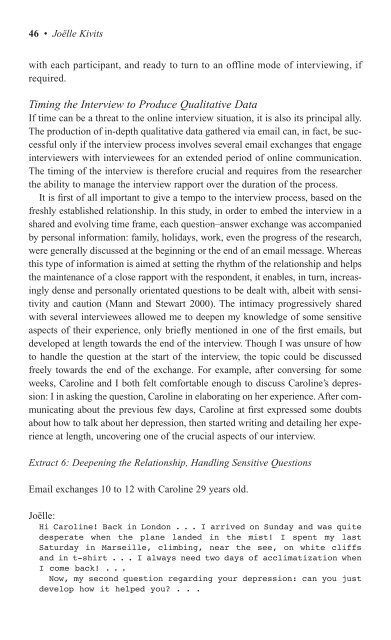Virtual Methods
Virtual Methods
Virtual Methods
Create successful ePaper yourself
Turn your PDF publications into a flip-book with our unique Google optimized e-Paper software.
46 • Joëlle Kivits<br />
with each participant, and ready to turn to an offline mode of interviewing, if<br />
required.<br />
Timing the Interview to Produce Qualitative Data<br />
If time can be a threat to the online interview situation, it is also its principal ally.<br />
The production of in-depth qualitative data gathered via email can, in fact, be successful<br />
only if the interview process involves several email exchanges that engage<br />
interviewers with interviewees for an extended period of online communication.<br />
The timing of the interview is therefore crucial and requires from the researcher<br />
the ability to manage the interview rapport over the duration of the process.<br />
It is first of all important to give a tempo to the interview process, based on the<br />
freshly established relationship. In this study, in order to embed the interview in a<br />
shared and evolving time frame, each question–answer exchange was accompanied<br />
by personal information: family, holidays, work, even the progress of the research,<br />
were generally discussed at the beginning or the end of an email message. Whereas<br />
this type of information is aimed at setting the rhythm of the relationship and helps<br />
the maintenance of a close rapport with the respondent, it enables, in turn, increasingly<br />
dense and personally orientated questions to be dealt with, albeit with sensitivity<br />
and caution (Mann and Stewart 2000). The intimacy progressively shared<br />
with several interviewees allowed me to deepen my knowledge of some sensitive<br />
aspects of their experience, only briefly mentioned in one of the first emails, but<br />
developed at length towards the end of the interview. Though I was unsure of how<br />
to handle the question at the start of the interview, the topic could be discussed<br />
freely towards the end of the exchange. For example, after conversing for some<br />
weeks, Caroline and I both felt comfortable enough to discuss Caroline’s depression:<br />
I in asking the question, Caroline in elaborating on her experience. After communicating<br />
about the previous few days, Caroline at first expressed some doubts<br />
about how to talk about her depression, then started writing and detailing her experience<br />
at length, uncovering one of the crucial aspects of our interview.<br />
Extract 6: Deepening the Relationship, Handling Sensitive Questions<br />
Email exchanges 10 to 12 with Caroline 29 years old.<br />
Joëlle:<br />
Hi Caroline! Back in London . . . I arrived on Sunday and was quite<br />
desperate when the plane landed in the mist! I spent my last<br />
Saturday in Marseille, climbing, near the see, on white cliffs<br />
and in t-shirt . . . I always need two days of acclimatization when<br />
I come back! . . .<br />
Now, my second question regarding your depression: can you just<br />
develop how it helped you? . . .



